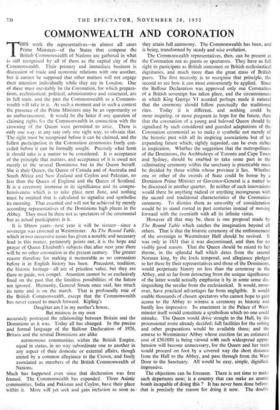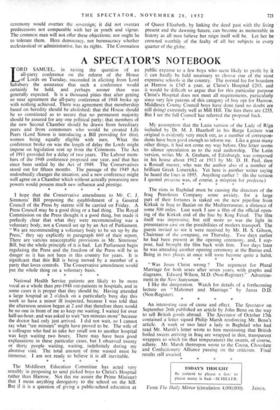COMMONWEALTH AND CORONATION
THIS week the representatives—in almost all cases Prime Ministers—of the States that compose the British Commonwealth of Nations are gathered in what is still recognised by all of them as the capital city of the Commonwealth. Their primary and immediate business is discussion of trade and economic relations with one another, but it cannot be supposed that other matters will not engage their attention individually while they are in London. One of these must inevitably be the Coronation, for which prepara- tions, ecclesiastical, political, administrative and structural, are in full train, and the part the Commonwealth as a Common- wealth will take in it. At such a moment and in such a context the presence of the Prime Ministers may be an opportunity or an embarrassment. It would be the latter if any question of claiming rights for the Commonwealth in connection with the crowning of the Queen were permitted to arise. There is .only one way, at any rate only one right way, to obviate that. The right must be recognised before it can be claimed, and the fullest participation in the Coronation ceremonies freely con- ceded before it can be formally sought. Precisely what form it should take is a matter to be considered. It is acceptance of the principle that matters, and acceptance of it is owed not merely to the several Dominions but to the Queen herself. She is their Queen, the Queen of Canada and of Australia and South Africa and New Zealand and Ceylon and Pakistan, no less than the Queen of England and the Queen of Scotland. It is a ceremony immense in its significance and its compre- hensiveness which is to take place next June, and nothing must be omitted that is calculated to signalise and symbolise its meaning. That essential end will not be achieved by merely according representatives of the Dominions high places in the Abbey. They must be there not as spectators of the ceremonial but as actual participators in it.
It is fifteen years—next year it will be sixteen—since a sovereign was crowned at Westminster. As The Round Table, which in two successive issues has given a notable and necessary lead in this matter, pertinently points out, it is the hope and prayer of Queen Elizabeth's subjects that after next year there will be no other coronation in the present century. The greater reason therefore for making it memorable as no coronation before it in English history has been. Precedent, tradition, the historic heritage—all are of priceless value, but they are there to guide, not compel. Attention cannot be so exclusively fixed on the past that the limitless possibilities of the future are ignored. Humanity, General Smuts once said, has struck its tents and is on the march. That is profoundly true of the British Commonwealth, except that the Commonwealth has never ceased to march forward. Kipling's Daughter am I in my mother's house, But mistress in my own accurately portrayed the relationship between Britain and the Dominions as it was. Today all has changed. In the precise and formal language of the Balfour Declaration of 1926, Britain and the several Dominions are alike autonomous communities within the British Empire, equal in status, in no way subordinate one to another in any aspect of their domestic or external affairs, though united by a common allegiance to the Crown, and freely associated as members of the British Commonwealth of Nations.
Much has happened even since thit declaration was first framed. The Commonwealth has expanded. Three Asiatic communities, India and Pakistan and Ceylon, have their place within it. More will yet seek and gain inclusion as soon as - they attain full autonomy. The Commonwealth has been, and is being, transformed by steady and wise evolution.
The Commonwealth representatives, then, can be present at the Coronation not as guests or spectators. They have as full right to participate as British statesmen or British ecclesiastical dignitaries, and much more than the great mass of British peers. The first necessity is to recognise that principle, the second to see how it can most conveniently be applied. Since the Balfour Declaration was approved only one Coronation of a British sovereign has taken place, and the circumstances in which King George VI acceded perhaps made it natural that the ceremony should follow punctually the traditional rites. Today it is different, and nothing could be more inspiring, or more pregnant in hope for the future, than that the coronation of a young and beloved Queen should be signalised by such considered and guarded adaptations of the Coronation ceremonial as to make it symbolic not merely of the historic past with all its inspiring associations but of 'an expanding future which, rightly regarded, can be even richer in inspiration. Whether the suggestion that the metropolitans of the Dominions, the Archbishops of Toronto and Cape Town and Sydney, should be enabled to take some part in the culminating ceremony within the sanctuary is practicable must be decided by those within whose province it lies. Whether one or other of the swords of State could be borne by a Dominion Prime Minister or Governor-General is a matter to be discussed in another quarter. In neither of such innovations would there be anything radical or anything incongruous with the sacred and traditional characteristics of the Coronation ceremony. To dismiss them as unworthy of consideration would be to stand rooted in past Centuries instead of moving forward with the twentieth with all its infinite vistas.
However all that may be, there is one proposal made by The Round Table which catches the imagination beyond all others. That is that the historic ceremony of the enthronement of the sovereign in Westminster Hall should be revived. It was only in 1831 that it was discontinued, and then for no visibly good reason. That the Queen should be raised to her throne, in the splendid hall which dates from the second Norman king, by the lords temporal, and allegiance pledged to her there by their representatives and those of the Dominions, would perpetuate history no less than the ceremony in the Abbey, and so far from detracting from the unique significance of the latter would actually emphasise it by in some sense dis- tinguishing the secular from the ecclesiastical. It would, more- over, have practical advantages far from negligible. It would enable thousands of chosen spectators who cannot hope to gain access to the Abbey to witness a ceremony as historic and hardly less impressive. Its enactment in the Palace of West- minster itself would constitute a symbolism which no one could mistake. The Queen would drive straight to the Hall, by the processional route already decided; full facilities for the robing and other preparations would be available there; and the annexe to Westminster Abbey whose erection (at an estimated cost of £50,000) is being viewed with such widespread appre- hension will become unnecessary, for the Queen and her train would proceed on foot by a covered way the short distance from the Hall to the Abbey, and pass through from the West Door to the Sanctuary. All would be easy, simple, dignified, impressive.
The objections can be foreseen. There is not time to make such departures now; is a country that can make an atomic bomb incapable of doing this ? It has never been done before; that is precisely the reason for doing it now. The double



































 Previous page
Previous page